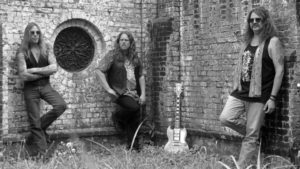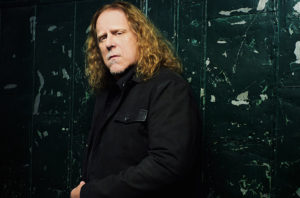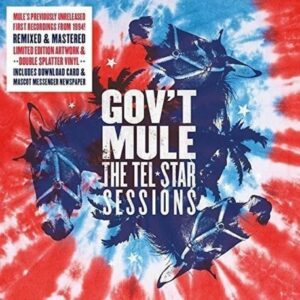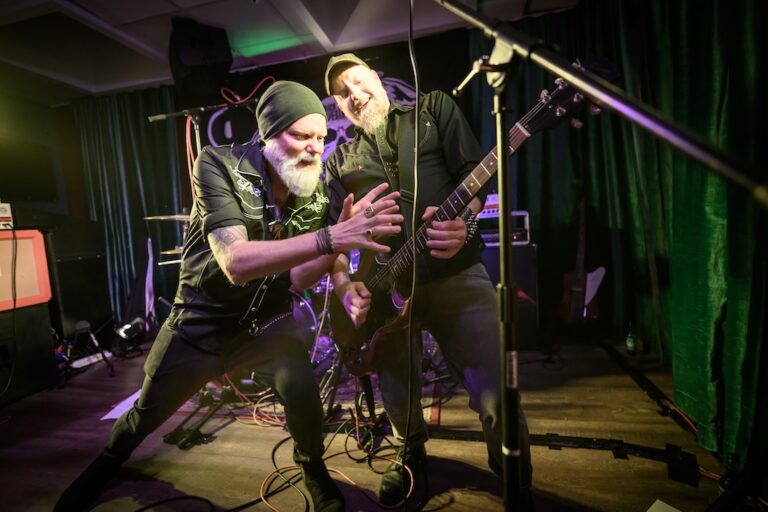Over twenty years (well twenty-one now), Gov’t Mule have progressed from a little-known side project led by Allman Brothers guitarist Warren Haynes, to one of the most highly thought of jam bands in the world. Over the course of the last year the band have celebrated their landmark anniversary with a series of archival releases, each one capturing a side of the band above and beyond the ordinary. Releases included ‘Sco-Mule’, the band’s collaboration with John Scofield (which is discussed here), ‘Dub Side of the mule’ (with Toots Hibbert), ‘Stoned side of the mule’ (a selection of Rolling Stones covers), ‘Dark Side of the Mule’ (which included a full set of Pink Floyd covers) and, at long last, ‘The Tel Star Sessions.
Long sought after by fans, this release is the first time that the band’s first ever recordings have been released and they have been worth the wait. Exciting, raw and capturing the band right at the start of their lengthy career, it is a chance to celebrate the wonderful talent of Allen Woody, the bassist who so tragically lost his life sixteen years ago, in 2000. It is, therefore, a wonderful opportunity to talk to Warren about the legacy of Gov’t Mule, the preparation of these special archival sessions and more and we were lucky to spend some time talking to Warren just prior to the release of the album.

First of all, one of the main reasons for this interview is ‘The Tel Star Sessions’ which have been long unavailable. This album represents very much a time in your career when Gov’t Mule was a side project and had no real destination – it must be odd for you to revisit that period after so long?
Yeah, I had not heard those recordings for a long, long time until a couple of years ago when I listened to them for the first time when we were considering options for archival releases for the twentieth anniversary. It had always been in the back of my mind that we should release ‘The Tel star Sessions’. I always loved them and was very proud of what we had done, but eventually as all of those songs, with the exception of two of the covers, had appeared on other studio releases, it was necessary that they be an archival release. So, when this came about, I listened to them and I was very happy – it reminded me of why we became a band in the first place.
When listening to this, I felt very much that Allen Woody’s bass really stood out and that was the same with ‘Sco-Mule’, which you released last year, they’re both wonderful tributes to his playing and his time with the band…
Yeah, I think that Woody sounds amazing on ‘The Tel Star Sessions’ and the way he communicated with Matt, musically speaking, without verbally communicating… because they didn’t talk about what they were going to do, they just had this uncanny chemistry that worked amazingly well, and I think the ‘Tel Star sessions’ is very representative of that chemistry that those guys had, right from the beginning.
‘The Tel Star Sessions’ particularly are very heavily based around improvisation – you hadn’t worked out a plan beforehand I think?
Yeah, we… when we first started talking about doing a side project, it was originally intended to be very experimental with very few compositions so to speak, just a lot of improve and taking a basic theme and expanding it, in a lot of ways, like a jazz band. But by the time we got into the studio, I had written a handful of songs which seemed to make sense for the project, so it was changing week-by-week, but we only knew a handful of songs together at that point. We did not make plans to do an actual tour or a follow-up recording or anything. But we started getting a lot of attention from record companies, wanting to get involved with what we were doing. Meanwhile, I was writing more and more songs and it was starting to change complexion a little bit, it was starting to become more of an actual band and less of a side project, and starting to become more song-orientated. But we were still maintaining that experimental philosophy. ‘The Tel star sessions’ were the first recordings we ever did and those nine songs are the extent of everything we recorded, there’s nothing left that we haven’t released, so it’s kind of a snap shot of where we were at that time and we put those tapes on the shelf, to pursue a plan of using a producer and recording for a label – spending someone else’s money because, those recordings were done… we paid for them ourselves, so we owned them from the very beginning.
In the sense of being experimental and almost like a jazz band, it seems that the ‘Sco-Mule’ album realised the ambition that started with ‘The Tel Star Sessions’?
Yeah. It was only a few years later that we contacted John Scofield about doing something together. We agreed on the song selection in advance and then we rehearsed for one day and then we did two shows, one in Athens, Georgia; one in Atlanta, Georgia, and we bought in a recording truck for both of the shows. I think at that time we probably felt we would release the ‘Sco-Mule’ sessions, the live recordings, in the next year or so. But then, when Allen Woody passed away, everything kind of changed and those recordings didn’t come out for a long time. When I hear them now, I see the connection that you’re making between the ‘Tel Star Sessions’ and the ‘Sco-Mule’ Live recording because Allen Woody represents himself loud and proud.
Last year was obviously a very important year for Gov’t Mule because of the anniversary and all of these archival releases coming out. I loved ‘Sco-Mule’, but of all the sessions I really loved ‘Dub side of the mule’ because I think it was less… expected in a way and showed such a different side of the band.
Every Halloween and every New Year’s Eve we do some crazy, thematic show and we always record them for archival purposes. In most cases, never really intending for them to be commercial releases. But we do it just for the fun and the challenge of it. But there are other bands in the jam band scene in America that do similar things, for example Wide Spread Panic, Phish, Umphrey’s McGee and The String cheese incident. All these bands do these crazy shows for Halloween and New Year’s Eve and it’s a chance for band and the audience to be part of something that is completely different than every other show. They tend to be very memorable performances and so that’s where ‘dub side of the mule’ and stoned side of the mule’ came from. That particular one you’re referring to, ‘Dub side…’, we had Toots Hibbert with us for an hour and that was really some amazingly fun and interesting music to play with him. He’s such a legend, but we also had Gregg Allman and John Popper and Gordie Johnson and quite a few other friends in the house, as well, so it was one of those really long shows that we do some times and it turned out great and I’m glad we could put it out.
For me, one of the most important things to me in any music that I listen to is that you can hear the passion and excitement of the musicians and I think that translates really well on all of your archival releases – there’s so much passion and energy coming off all of those recordings.
Well, you know, for us, it’s all about doing what it is that we love to do. And so, we’re never thinking “what would the audience expect of us?” or “what would the audience really love us to do?” We’re just doing what we want to do and thankfully the audience enjoys it. But it has to start with us having fun and us being passionate and excited about what we’re doing, so, yeah I think you can hear that in the recordings.

Speaking of doing what you want to do, one of the major releases of last year was your own solo album. I may be wrong, but I believe that those songs cover thirty years of song writing?
Yeah, I’d been writing those kind of songs for most of my life and I’d always wanted to put out a record that reflected that I felt like I’d finally reached a point in my life where I had so many of those songs, that I’d better get into a studio and start recording them and I think it was good timing in a way that… had I done it five years earlier or ten years earlier, the audience might have been a little confused by it, but I think that my audience for the most part understands that that side of me exists and that they can expect anything.
It’s a beautiful record, but it’s also quite melancholic in places with songs like ‘Blue Maiden’s tale’ and even tracks like ‘Company Man’ which has a powerful beat to it, yet details quite a dark tale – what inspires your lyrics?
Well, I think folk music is that way and all these songs are very influenced by folk music and written in the tradition of folk music. ‘Company man’, as an example, was written about my father. It’s a true story – every word of that song is true. It’s his life, which was up and down, you know. But I think I’ve always been inspired by songwriters that told stories, even in the rock field. Of course, in the more acoustic side of things, the folk side of things, starting with Bob Dylan, all that kind of stuff. I also love Jackson Brown, James Taylor and people like that who are great at telling stories. In the rock world, people like Tom Waits, Elvis Costello, Roger Waters, Neil Young and Rikki Lee Jones… I just, have always been enamoured with that approach to song-writing, and even though I was coming from a different direction musically, I never saw any reason to limit my lyrical influences to only rock ‘n’ roll writers.
I think it’s easy to get straight-jacketed by genres, but the best song-writers, in whatever field, take liberally from all genres. Roger Waters, for example, dabbled in many genres from rock to prog to classical and, I guess that’s what makes him a great artist.
Yeah, I think the more genres of music that you study and the more music in general that you listen to and study, it helps you find your own voice and who you are. If you only listen to music that people expect you to listen to, you’re limiting yourself as far as the scope and… I guess, partially because I grew up listening to so many different types of music, I’ve always enjoyed playing different types of music and writing different approaches and it’s just been something I’ve enjoyed from the very beginning.
One of the songs that stood out for me was your cover of the Fleetwood Mac track, ‘Gold dust woman’. It always struck me as a very dark, very powerful song and I really feel you made it your own on your album. What is it that you look for in a song that makes you choose a cover version?
Well, I’ll start by saying that I didn’t go into the process of ‘Ashes and dust’ with the thought of recording ‘Gold dust woman’, it just kind of came up organically one day. I was thinking with that Celtic instrumentation- the mandolin, the banjo and the upright bass – I was thinking that it would be nice to take a stab at that song and Grace Potter and I had performed it live quite a few times, but never thought of recording it. But I think the different slant on it really made that decision for me. As far as what reason to do a cover – it could be a song I’ve always wanted to be a song, or it could be a song I wish I’d written, or it could be a song that I love and feel like I could take to a different place. One of those three things has to be involved for me to perform a cover song.
Back to ‘The Tel Star sessions’, that’s got a blistering cover of ZZ Top’s ‘just got paid’, ZZ Top are a band who really seem to have captured the American imagination and they seem to be a huge influence on a number of bands.
Early ZZ Top was a big influence on all of us. Of course, now that I’ve been friends with Billy Gibbons for a long, long time… we’ve played together quite a few times and we’re actually touring together in a couple of months. But, in 1994 when Gov’t Mule was a brand new band… not even a band, just a side project, that was one of the first covers that we worked up and it was very representative of the influence we were taking at that time and I think we only did one take of it. We thought we ought to do one take of ‘just got paid’ and if it was good we’d keep it and that’s what we did and when I hear it back now, it’s quite good.

I’m a huge physical music junkie, and one of the things I look for is a strong visual element – for example the cover, liner notes or vinyl or whatever – how much attention do you personally pay to your releases?
Well, I’m very involved with the packaging and the artwork and even writing liner notes and making sure that the credits are very detailed. I try to make sure that we come out on vinyl and utilize as many different packaging options as possible. Also, the sequencing of the records. It’s still important to me and to all of us that a record have a personality. I still look at our recordings as albums, to be listened to from start to finish. And if someone listens to them track-by-track, that’s fine, but our intent is for them to hear the whole thing as a concept and I still believe in that concept and I think that with the music we make, and a lot of the music, if not all of the music we love, you don’t get the whole picture unless you listen to the entire album and hopefully in the sequence it was meant to be delivered.
Sequencing is so massively important in terms of making the album into a journey – do you find the art of sequencing particularly challenging?
Yeah, I enjoy it, and I find that it also, assuming that we’ve recorded enough music to have a few songs left over, the sequencing helps decide which ones make the final cut and which ones don’t because I have to be satisfied with the journey that the sequencing takes you on. If I’m not, then it’s back to the drawing board. So there have been instances where I’ve wanted a certain song to be released on a recording but it didn’t make it because it didn’t seem to fit the flow of the sequence, and I wish more bands and artists still thought that way, but I understand there are changing times. I have a feeling that this sort of thought process will be around and keep coming back.
I think it depends very much on genre and things – there are a lot of prog bands and rock bands that are still very positive about the album and, I very much hope that it will continue. It’s such a pleasure to look at the liner notes and when a band takes care of that sort of thing it always adds to the joy of buying and listening to that album.
Yeah, it was so important to us as impressionable listeners growing up, you know. It should remain equally important.
It’s been such a pleasure talking to you and I’ve taken up a lot of your time, so really I’d just like to ask if you have any final words for your UK fans?
Well, I’m excited that this music is finally going to see the light of day and even for someone who’s just discovering Gov’t Mule for the first time, it’s not a bad first impression. If you’re a fan of Gov’t Mule’s music already, it’ll put a smile on your face, I know it did for me.
‘The Tel Star Sessions’ were released via Mascot on August 5th and are available now on CD and Vinyl. You can read our full review of the album here.



